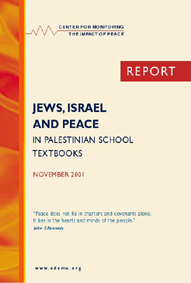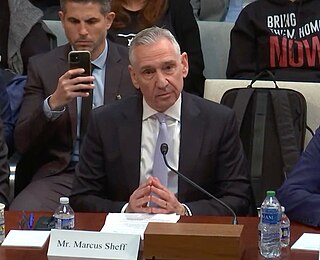Antisemitism has increased greatly in the Arab world since the beginning of the 20th century, for several reasons: the dissolution and breakdown of the Ottoman Empire and traditional Islamic society; European influence, brought about by Western imperialism and Arab Christians; Nazi propaganda and relations between Nazi Germany and the Arab world; resentment over Jewish nationalism; the rise of Arab nationalism; and the widespread proliferation of anti-Jewish and anti-Zionist conspiracy theories.

The United Nations Relief and Works Agency for Palestine Refugees in the Near East is a UN agency that supports the relief and human development of Palestinian refugees. UNRWA's mandate encompasses Palestinians who fled or were expelled during the Nakba, the 1948 Palestine War, and subsequent conflicts, as well as their descendants, including legally adopted children. As of 2019, more than 5.6 million Palestinians are registered with UNRWA as refugees.
Arab–Israeli peace projects are projects to promote peace and understanding between the Arab League and Israel in different spheres. These are part of a broader attempt at a peace process between Palestinians and Israelis. Sponsors of such projects can be found both in Israel and Palestine.

Interfaith dialogue, also known as interreligious dialogue, refers to cooperative, constructive, and positive interaction between people of different religious traditions and/or spiritual or humanistic beliefs, at both the individual and institutional levels.

Michael Melchior is a Jewish leader, Orthodox rabbi, thinker, and activist. He is a former Minister of Social and Diaspora Affairs, a former Deputy Minister of Foreign Affairs, and a former member of Knesset for Meimad. He is the Rabbi of a community in Talpiyot, Jerusalem, while still holding the title of the Chief Rabbi of Norway.
Bias in curricula refers to real or perceived bias in educational textbooks.

Education in Israel encompasses consists of three primary tiers: primary education, middle school, and high school. Compulsory education spans from kindergarten through 12th grade. The academic year begins on September 1 and ends on June 30 for elementary pupils and June 20 for middle and high school pupils. The Haredi Yeshivas adhere to a separate schedule, commencing on 1 Elul.
The Saudi Arabian textbook controversy refers to criticism of the role of the content of school textbooks in Saudi Arabia in the perpetration of the September 11 attacks.
Textbooks in Israel and the Palestinian territories have emerged as an issue within the larger Israeli–Palestinian conflict.
Textbooks in Israel are published in Israel by the Ministry of Education of Israel and other educational institutions.
The Institute for Monitoring Peace and Cultural Tolerance in School Education (IMPACT-SE), formerly known as the Center for Monitoring the Impact of Peace (CMIP), is an Israeli non-profit organization that monitors the content of school textbooks.

Palestinian Textbooks: From Arafat to Abbas and Hamas is a March 2008 publication by the Institute for Monitoring Peace and Cultural Tolerance in School Education (IMPACT-SE) and the American Jewish Committee (AJC). The book summarizes former analyses by IMPACT-SE of Palestinian Authority textbooks, beginning in 1998, and outlines how Palestinian school textbooks have changed or not changed under the leadership of Yassir Arafat, Mahmoud Abbas, and Hamas regarding the portrayal of peace and the 'Other', namely Israel and Jews.

Jews, Israel and Peace in Palestinian School Textbooks is a November 2001 publication by the Institute for Monitoring Peace and Cultural Tolerance in School Education -- then the Center for Monitoring the Impact of Peace -- on how Palestinian school textbooks portray peace and the 'Other', namely Jews and Israel. The publication is the first in a series of textbook analyses on Palestinian textbooks, with the most recent publication, Palestinian Textbooks: From Arafat to Abbas and Hamas, published in March 2008.

The West, Christians and Jews in Saudi Arabian Schoolbooks is a January 2003 publication by the Institute for Monitoring Peace and Cultural Tolerance in School Education (IMPACT-SE), which was known as CMIP at the time of publication. The publication analyzes how Saudi Arabian school textbooks portray the West, Christians, and Jews.
The Protocols of the Elders of Zion is a fabricated antisemitic text purporting to describe a Jewish plan to achieve global domination. The text was fabricated in the Russian Empire, and was first published in 1903. While there is continued popularity of The Protocols in nations from South America to Asia, since the defeat of Nazi Germany, Fascist Italy, and Imperial Japan in World War II, governments or political leaders in most parts of the world have generally avoided claims that The Protocols represent factual evidence of a real Jewish conspiracy. The exception to this is the Middle East, where a large number of Arab and Muslim regimes and leaders have endorsed them as authentic. Past endorsements of The Protocols from Presidents Gamal Abdel Nasser and Anwar Sadat of Egypt, Iraqi President Arif, King Faisal of Saudi Arabia, and Colonel Muammar al-Gaddafi of Libya, among other political and intellectual leaders of the Arab world, are echoed by 21st century endorsements from the Grand Mufti of Jerusalem, Sheikh Ekrima Sa'id Sabri, and Hamas, to the education ministry of Saudi Arabia.
Ephraim Isaac is an Ethiopian scholar of ancient Ethiopian Semitic languages and of African and Ethiopian civilizations. He founded the Institute of Semitic Studies, which he directs from his home in Princeton, NJ, and is the chair of his Ethiopian Peace and Development Center.

Ada Aharoni is an Egyptian-born Israeli poet, writer, lecturer, sociologist and peace researcher. She has published numerous books of peace poetry, historical novels, sociology, history, biography, drama, film-scripts, literary criticism, and children's books. In her work she often focuses on the "Second Exodus", the uprooting of the Jews from Egypt, following the establishment of Israel in 1948, which she personally experienced. Aharoni is the founder and world president of The International Forum for the Literature and Culture of Peace (IFLAC).
Saudi Arabian media often attacks Jews in books, news articles, and mosques with what some describe as antisemitic satire. Saudi Arabian government officials and state religious leaders often promote the idea that Jews are conspiring to take over the entire world; as proof of their claims, they publish and frequently cite The Protocols of the Elders of Zion as factual.

Marcus Sheff is an Israeli-British non-profit chief executive officer (CEO), former media executive and journalist.









